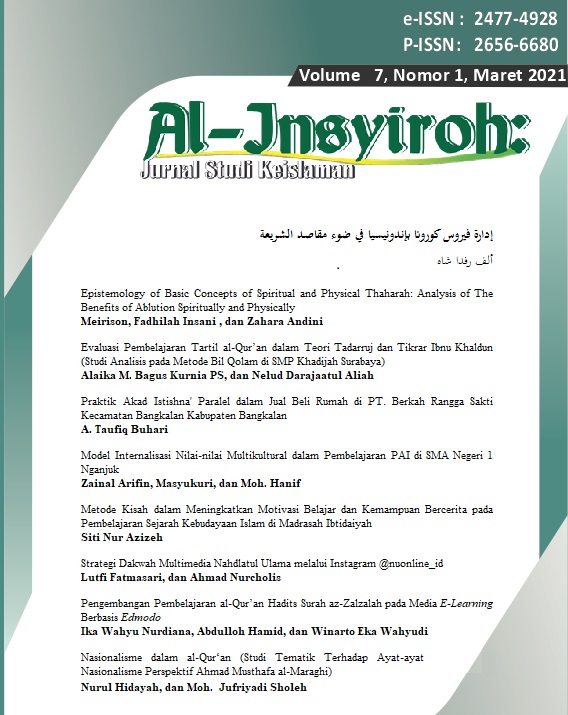Epistemology of Basic Concepts of Spiritual and Physical Thaharah: Analysis of The Benefits of Ablution Spiritually and Physically
DOI:
https://doi.org/10.35309/alinsyiroh.v7i1.4080Keywords:
Epidemiology, Concept, ThaharahAbstract
This article aims to explain the purpose of purification in various forms. Purification outwardly and inwardly will be obtained when following the rules given by the Qur'an and Hadith. Purification (thaharah) is one of the legal conditions in performing Salat. When we start performing an act of worship such as Salat, many of us are not right or wrong when taking ablution or sometimes after removing many unclean impurities. I did a literature study with a descriptive analysis approach and found that three ways can be pure: bathing, ablution, and tayammum. The tools used for bathing and ablution are water and for tayammum using soil (dust). As we know, Tayammum can only be done when there is no water and in a state of pain. Purification also removes not only the contaminated feces but also the inner. In purifying, using absolute water or using soil (dust) must meet certain conditions. By doing purification according to the provisions of Rasulullah, then we will get external and internal purity. Keywords: Epidemiology, Concept, Spiritual, Physical, ThaharahReferences
Al-Anees, Abdel Samie Mohamed. “The Prophetic Tradition on Wudu’ (Ablution) at Anger: A Tradition Study.†مجلة كلية الشريعة و الدراسات الإسلامية (2017). Accessed January 27, 2021. http://journals.qu.edu.qa/index.php/sharia/article/view/64.
Daradjat, Zakiah, and Indonesia, eds. Ilmu Pendidikan Islam. Cet. 2. Jakarta: Diterbitkan atas kerjasama Penerbit Bumi Aksara, Jakarta dengan Direktorat Jenderal Pembinaan Kelembagaan Agama Islam, Departemen Agama, 1992.
Ebtesam Algarni. “أØكام الØيوان ÙÙŠ كتبي الطهارة والصلاة دراسة Ùقهية موازنة†(2000). Accessed January 27, 2021. http://rgdoi.net/10.13140/RG.2.2.17202.81609.
Fani Reza, Iredho. “Wudu as Islamic Psychotherapy to Improve Sleep Quality in Young Women.†Journal An-Nafs: Kajian Penelitian Psikologi 5, no. 1 (June 1, 2020): 64–75.
Furkani̇, Mehterhan. “Cemal-i Halvetî El-Aksarayî’nin Esraru’l-Vudû Adlı Eserinin Tahkik ve İncelenmesi.†Mütefekkir 4, no. 7 (June 30, 2017): 173–195.
M Sabra, Sherifa Mostafa. “Ablution (Wudu) Health Benefits (HBs) through Comparison Nasal–Cavity (NC) Bacterial–Content (BC) with Gold–Standard (GS) at High–Altitude (HA) Area, Taif, KSA.†Journal of Applied Biotechnology & Bioengineering 5, no. 6 (November 16, 2018). Accessed January 27, 2021. https://medcraveonline.com/JABB/ablution-wudu-health-benefits-hbs-through-comparison-nasalndashcavity-nc-bacterialndashcontent-bc-with-goldndashstandard-gs-at-highndashaltitude-ha-area-taif-ksa.html.
Meirison, Husnul Fatarib. “Al-Hajat As The Basis of Contemporary Ijtihad†17, no. 1 (2020): 105–121.
Meirison, Meirison, and M. Harir Muzakki. “Implementing The Spirit of Jihad in Sufism.†Jurnal THEOLOGIA 31, no. 1 (November 6, 2020): 1.
Mufaizin, Mufaizin. “Kearifan Syariat Dan Hikmah Dalam Puasa.†Al-Insyiroh: Jurnal Studi Keislaman 2, no. 1 (March 16, 2018): 103–127.
Putra, M. K. B. (2015). Eksistensi Sistem Pesantren Salafiyah dalam Menghadapi Era Modern. Al-Insyiroh: Jurnal Studi Keislaman, 1(1), 87-104.
Prathapar, S. A., M. Ahmed, S. Al Adawi, and S. Al Sidiari. “Design, Construction and Evaluation of an Ablution Water Treatment Unit in Oman: A Case Study.†International Journal of Environmental Studies 63, no. 3 (June 2006): 283–292.
Sali, Meirison Alizar, Desmadi Saharuddin, and Rosdialena Rosdialena. “Takhrij Fikih Dan Permasalahan Kontemporer.†Al-Istinbath : Jurnal Hukum Islam 5, no. 1 (May 9, 2020): 51.
SaraḫsÄ«, Muḥammad Ibn-Aḥmad as-, AbÅ«-Ê¿AbdallÄh Muḥammad Ḥasan Muḥammad Ḥasan IsmÄÊ¿Ä«l aÅ¡-Å ÄfiÊ¿Ä«, and KamÄl Ê¿Abd-al-Ê¿Aẓīm al-Ê¿InÄnÄ«. KitÄb al- MabṣūṠfi ’l-fiqh al-ḥanafÄ«. BairÅ«t: DÄr al-Kutub al-Ê¿IlmÄ«ya, 2009.
ZuḥailÄ«, Wahba az-. al-Fiqh al-islÄmÄ« wa-adillatuhÅ«: aÅ¡-Å¡Ämil li-ʾl-adilla aÅ¡-Å¡arÊ¿Ä«ya wa-ʾl-ÄrÄ al-maá¸habÄ«ya wa-ahamm an-naẓarÄ«yÄt al-fiqhÄ«ya wa-taḥqÄ«q al-aḥÄdīṯ an-nabawÄ«ya wa-taḫrīǧihÄ mulḥaqan bihÄ« fahrasa alfÄbÄʾīya Å¡Ämila li-ʾl-mauá¸Å«Ê¿Ät wa-ʾl-masÄʾil al-fiqhÄ«ya. Ǧuzʾ 11: al-FahÄris al-Ê¿Ämma: fahrasa alfabÄʾȳia Å¡Ämila li-ʾl-ÄyÄt wa-ʾl-aḥÄdīṯ wa-ʾl-mauá¸Å«Ê¿Ät al-fiqhÄ«ya. Nachdr. der vierten verb. Ausg. DimaÅ¡q BairÅ«t: DÄr al-fikr, 2002.
ابن قدامة، موÙÙ‚ الدين عبد الله بن اØمد،, شاÙعي، Ù…Øمد Øسن Ù…Øمد Øسن اسماعيل, and جعÙر، اØمد Ù…Øروس. الكاÙÙŠ ÙÙŠ Ùقه الامام اØمد بن Øنبل. بيروت: منشورات Ù…Øمد علي بيضون، دار الكتب العلمية،, 2001.
البدري, سالم مصطÙÙ‰, and Ù…Øمد بن علي/الشوكاني. الدراري المضية Ø´Ø±Ø Ø§Ù„Ø¯Ø±Ø± البهية. Dar al-Kutub al-`Ilmiyah, 2003. https://books.google.co.id/books?id=OH6DDwAAQBAJ.
الØاج, عبد الرØمن. “التأصيل الÙقهي ÙÙŠ الاجتهاد الØديث: تطويع الÙقه لمقتضيات العصر.†Journal of Islamic Ethics 3, no. 1–2 (December 27, 2019): 64–89.
الØÙ‚, عظيم آبادي، Ù…Øمد شمس. عون المعبود Ø´Ø±Ø Ø³Ù†Ù† أبي داود: Ê»Awn al-maÊ»bÅ«d sharḥ Sunan AbÄ« DÄwÅ«d v. 7. مكتبة المعار٠للنشر Ùˆ التوزيع،, 2009. https://books.google.co.id/books?id=DoJuAQAACAAJ.
الشاÙعي, تقي الدين Øسين الØصني, and خالد العطار. ÙƒÙاية الاخيار ÙÙŠ ØÙ„ غاية الاختصار. دار الارقم بن ابي الارقم - بيروت / لبنان, 2016. https://books.google.co.id/books?id=raMdDQAAQBAJ.
الناصر, ØµØ§Ù„Ø Ø¨Ù† ناصر بن سلیمان. “توجیه قراءتی النصب والجر ÙÛŒ قول الله تعالى: { وَأَرْجÙÙ„ÙŽÚ©Ùمْ } من آیة الوضوء ÙÛŒ سورة المائدة.†Øولیة کلیة أصول الدین والدعوة بالمنوÙیة 27, no. 27 (November 1, 2007): 189–205.
Downloads
Published
How to Cite
Issue
Section
License

This work is licensed under a Creative Commons Attribution-ShareAlike 4.0 International License.









